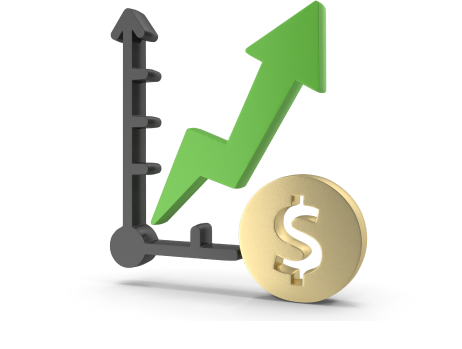Stock Indices
Access global stock indices with exceptional trading conditions.
What is Indices?
On Finspirefx, indices are collections of stocks designed to represent the performance of specific market segments or the overall economy. By tracking the weighted average of their included stocks, indices offer a comprehensive overview of market trends and economic conditions.
For example, prominent indices like the S&P 500 and NASDAQ-100 monitor the performance of various companies, providing insights into market movements and helping investors gauge overall market performance. Trading indices on Finspirefx enables you to access a broad spectrum of stocks with a single transaction, facilitating portfolio diversification and allowing you to take advantage of market trends.

What are Stock Indices?
A stock index is a collection of stocks that can be traded as a single instrument. While some traders focus on the price movements of individual assets, others prefer to trade stock indices, which reflect the performance of a sector or entire market.
Stock indices can be classified in various ways. For instance, the DAX 40 includes the 40 top-performing companies in Germany and serves as a ‘national stock index,’ providing insights into the German stock market's health.
Stock indices are not limited to geographical classifications. Some indices track specific market sectors. For example, the US Tech 100 index monitors the performance of companies listed on the Nasdaq exchange, predominantly in the technology sector. This index offers a gauge of the technology sector's health in the US.
Why TRADE STOCK INDICES with Finspirefx?
Our goal is to ensure trader success by delivering an exceptional trading experience.
- Low spreads.
- Access to 20+ Indices.
- 0.20s Average execution speed.
- All trading strategies enabled.
- Leverage up to 1:100.
HOW-TO
Trade Stock Indices
Stock indices consist of groups of firms, and their prices are influenced by various factors. Simply put, if the stocks within an index rise in value, the index’s price will increase, and if they fall, the index’s price will decrease.
Traders who speculate on stock indices make predictions about whether an index will go up or down based on market sentiment.
The price movement of an index is generally smoother compared to individual stocks since no single stock can cause dramatic price swings. However, stock indices can experience significant volatility as they may reflect broader political and economic changes.
Stock Indices Trading Hours
As stock indices are comprised of stocks traded across the globe, they have variable trading times. Check out the trading times below:
| INSTRUMENT | TRADING HOURS |
| AUS200 |
Mon-Thu: 02:50-09:30 / 10:10-24:00 Fri: 02:50-09:30 / 10:10-23:58 |
| DE40 |
Mon: 01:05-03:00 / 03:15-24:00 Tue-Thu: 01:02-03:00 / 03:15-24:00 Fri: 01:02-03:00 / 03:15-23:00 |
| US30 |
Mon-Thu: 01:00-24:00 Fri: 01:00-23:58 |
| STOXX50 |
Mon: 01:05-03:00 / 03:15-24:00 Tue-Thu: 01:00-03:00 / 03:15-24:00 Fri: 01:00-03:00 / 03:15-23:00 |
| FRANCE40 |
Mon-Fri: 09:00-23:00 |
| AFRICA40 |
Mon-Fri: 09:30-18:30 |
| ITALY40 |
Mon-Fri: 09:00-23:00 |
| UK100 |
Mon: 01:05-24:00 Tue-Thu: 01:00-24:00 Fri: 01:00-23:00 |
| HK50 |
Mon-Fri: 04:15-07:00 / 08:00-11:30 / 12:15-21:58 |
| SPAIN35 |
Mon-Fri: 09:00-21:00 |
| USTEC |
Mon-Thu: 01:00-24:00 Fri: 01:00-23:58 |
| JP225 |
Mon-Thu: 01:00-24:00 Fri: 01:00-23:58 |
| US500 |
Mon-Thu: 01:00-24:00 Fri: 01:00-23:58 |
| SWISS20 |
Mon-Fri: 09:00-23:00 |
| CHINA50 |
Mon-Fri: 01:00-23:59 |
| WIG20 |
Mon-Fri: 09:45-17:50 |
